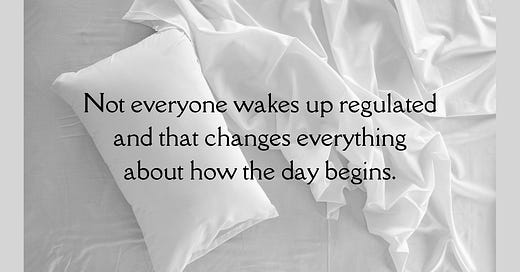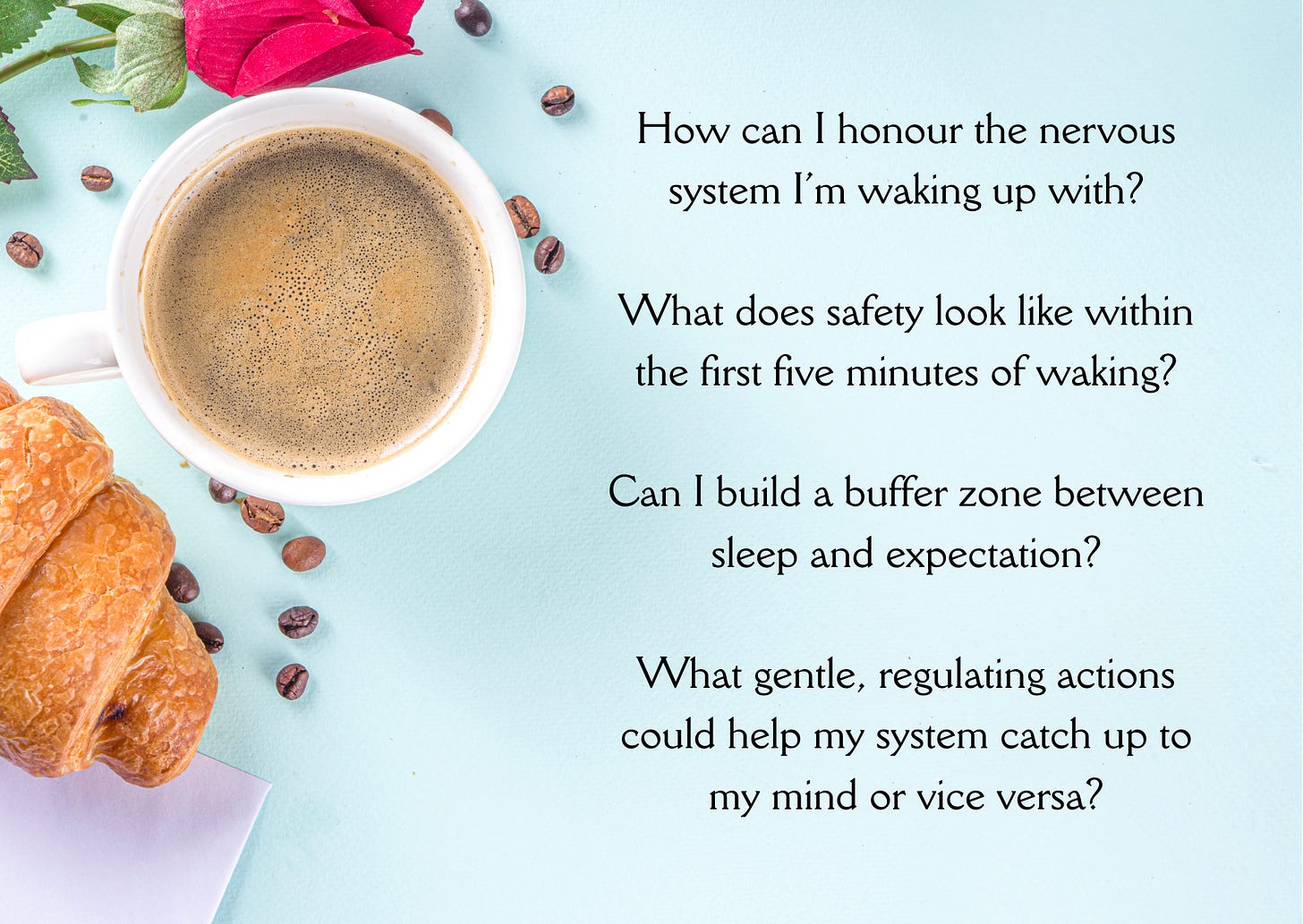We’re told that how we start our day defines everything: success, focus, health, morality. Wake early, drink water, stretch, meditate, journal, plan, produce. Repeat. If you struggle to do that or can’t do it something must be wrong with you.
This is the unspoken rule behind morning routine culture: productivity equals worth and the earlier you chase it, the better. But for many neurodivergent people, the morning isn’t a time of fresh starts. It’s a sensory onslaught, an emotional landmine and an internal tug-of-war between what our body needs and what the world demands. Exhausting isn't it?
This article explores why morning resistance isn’t laziness, how routine culture erases neurodivergent realities and why rituals offer a different way to begin the day.
Morning resistance isn’t laziness or avoidance
For some neurodivergent people mornings can be inherently dysregulating. You wake up and your brain is foggy. The light feels like an attack. The change in temperature dysregulates you. Your body is stiff or overstimulated. And instead of thinking “what’s for breakfast?” you wonder “how do I get through this?”.
Transitioning from sleep to wake is a major sensory and cognitive shift that doesn’t happen smoothly for everyone.
Executive function challenges make initiating action (like getting out of bed or brushing your teeth) disproportionately difficult.
Demand avoidance means even simple tasks can feel like overwhelming threats to autonomy.
Emotional regulation may be lowest in the morning, especially if there’s residual stress, dream-related confusion or interrupted sleep.
Morning resistance, in this context, is not avoidance. It’s information. It tells us what our nervous system is capable of not what we should be doing.
We tend to assume that waking up is a neutral or even refreshing process. That sleep resets the system. That most people rise into the day calm, clear and capable of moving forward. But this is simply not true. It's one of those blanket statements that negates the individual experience.
Not everyone wakes up regulated. And when you don’t, the very act of waking up becomes a negotiation with your nervous system.
Waking up dysregulated means you are already starting below baseline and yet you’re expected to get going as if you had access to calm or clarity. It's a given, right?
There are many reasons why someone might wake up dysregulated. Do you recognise any of these for yourself or your children?
💤 Restless or fragmented sleep
Sensory processing differences make it hard to stay in deep sleep cycles.
Sleep disorders disrupt true restoration.
Nighttime anxiety, nightmares or dream intensity leave lingering emotional residue.
💤 Hyper-vigilance or sleep with one eye open
Many neurodivergent people sleep in a state of partial alertness, especially if they’ve experienced trauma or live in unsupportive environments.
The stress from the day continues at night and the nervous system does not get the opportunity to fully relax and get a restful sleep. This creates what some describe as “waking up already exhausted,” even after a full night.
💤 Sensory environment clashes
The sudden change in temperature, lighting, noise or texture on waking can trigger sensory overwhelm.
The transition from the comfort of blankets to the external world can feel jarring and hostile. All this onslaught of input is a lot to process as soon as you open your eyes.
💤 Executive function difficulties or freeze state
The brain doesn’t easily switch from rest to action, it stalls and it needs that extra push to engage.
Thoughts pile up but action feels inaccessible.
💤 Emotional hangovers or subconscious stress
Unprocessed emotions from the previous day linger and carry on into the next day, regardless of the quality of sleep.
Some people wake up already deep in internal dialogue or dread which can be debilitating.
It's like the body hasn’t caught up to the mind or vice versa.
SENDwise Hub is a reader-supported publication. To receive new posts and support my work, consider becoming a free or paid subscriber.
How does all of this affect the waking up process?
💤 Delayed engagement
They may need an hour (or more) of silence, slow movement and zero demands before interaction feels possible.
Jumping straight into conversation or tasks can cause irritability or shutdown. The day is over before it's even started.
💤 Fight, flight, freeze, fawn responses
Some might lash out verbally or emotionally because their nervous system is bracing for threat.
Others might completely avoid waking up tasks: turning off alarms, hiding under blankets or going back to sleep to escape the demands.
💤 Self-blame and shame spirals
If society tells you “mornings are for motivation,” but you feel frozen, you might assume you’re lazy, defective or failing.
This emotional layering further dysregulates the system, compounding the original resistance.
💤 Non-linear wake-up needs
Linear task sequences can break down or cause stress. Some may need to stim, stretch, hide, snack, cry or sit in silence before even brushing their teeth. Others will follow a completely different sequence that makes sense to them and meets their needs.
★ Reframing the wake-up experience ★
Waking up is not like a flip of a switch for everyone. For many, it’s a slow gradient. And for some, it requires rebuilding trust with your body every single day.
Morning routine culture ignores neurodivergent realities. It’s deeply ableist in how it assumes that everyone wakes up regulated, structure equals safety and time is experienced uniformly.
In reality, many neurodivergent people experience temporal dissonance: time doesn’t feel linear or urgent. The morning doesn’t always register as beginning. The body may not feel available to act, even if the mind wants to.
Rituals vs. routines—building mornings from the inside out
Routine culture often weaponises consistency without compassion.
Consistency can be trauma-coded. You're already forced into unnatural rhythms, punished for being inconsistent and told your natural cycles are wrong.
A routine that ignores your access needs is harmful. Your needs do not suddenly disappear or minimise just because it is the dawn of a new day.
Where routine demands repetition, ritual invites relationship. A ritual doesn’t have to be the same every day it simply centres intention, emotion and safety.
Imagine a morning where you ask:
🌟 What do I need to feel okay before I do anything?
🌟 What sensations feel comforting right now?
🌟 What do I want to honour about myself before the world speaks?
This approach turns mornings into a practice of self-connection. It offers flexible, compassionate scaffolding instead of a rigid staircase.
Here’s some examples of rituals that affirm neurodivergent needs:
Turning on a soft lamp before opening your eyes.
Lying in bed for ten minutes with your weighted blanket before engaging.
Playing a comfort sound or stim video to ground your senses.
Skipping hygiene tasks until later and knowing that’s okay.
Rituals are somatic. They’re sensory. They’re emotionally truthful. They ask: How can I return to myself before I give myself away to what the day expects?
Final thought : You were never meant to perform readiness
The myth of the morning person is rooted in capitalism, ableism and a deep cultural discomfort with slowness. But you don’t have to earn your day by conquering the morning. You don’t have to justify your body’s resistance with shame.
What you can do is listen to your nervous system instead of silencing it.
You can build mornings that serve you not some invisible standard.
There is no moral virtue in early starts.
There is only you, your needs and your right to meet them slowly.
⭐ If you’re looking for neuro-affirming digital and affordable resources, you can browse them here.
⭐ Voting is still live for the National Diversity awards - click here.
⭐ If you’re on any social media, come join me on Facebook, Instagram or LinkedIn.







Teo, this is a wonderful and deeply necessary permission-giving piece. It’s a rarely addressed issue and you have explained and honoured it with eloquence and practicality. A deep bow of thanks
Brilliant!